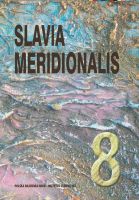Postchrześcijaństwo i postjudaizm w teorii kultury Philipa Rieffa
Post-Christianity and Post-Judaism in the Philip Rieff’s theory of culture
Author(s): Magdalena LubańskaSubject(s): Cultural history
Published by: Instytut Slawistyki Polskiej Akademii Nauk
Summary/Abstract: The article attempts to present the Philip Rieff’s theory of culture which constitutes a peculiar synthesis of sociology and theology. By pointing to social transformations which draw the attention of many modern sociologists, Rieff makes a “transliteration of the Torah’s religious language to the sociological language characteristic to the theory of culture” (Zondervan). He considers modern culture (“the culture of death”), referred by him as anticulture, principally antireligious that is hostile towards the sacral self, namely the most important metaphysical human element. By creating numerous deathworks its proponents attempt to drive out from people’s consciousness the Judeo-Christian values and truths originating from the Epiphany on the Mount of Sinai. As a result of all that a religious man is replaced by a psychological man while the psychoanalytic therapy takes place of the religious ritual. The therapy is supposed to help people in their narcissistic inclinations by freeing ego from the orders of the Decalogue although their post-Jewish and post-Christian subconsciousness constantly interferes. Rieff demonstrates how through works of art, literature and academic metanarrative Judeo¬ Christianity stops being understandable and essential to people. With the loss of understanding the sacral self undergoes reduction and the person becomes lost in the characters played anew that base on the readymade and impermanent scenarios.
Journal: Slavia Meridionalis
- Issue Year: 2008
- Issue No: 08
- Page Range: 365-387
- Page Count: 23
- Language: Polish

